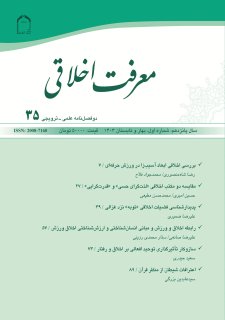Abstract:
Along with rational and moral virtues, religious virtues play a prominent role in the happiness and perfection of mankind. Virtues such as repentance, patience, gratitude, trust and the like create a system of values which is in line with intellectual and moral virtues, but its semantic, ontological and epistemological structure is derived from holy texts and is independent of the common terms of virtues in moral philosophy. In the meantime, it is not devoid of the analysis of moral concepts. The concept of "repentance" in religious language and literature is not an exception to this rule and can be examined from a normative, psychological and phenomenological point of view. As the first person, the moral agent finds himself in a religious situation which is in line with the moral situation in terms of behavior. In addition, externally he feels himself under the pressure of a duty that originates from outside him and does not represent a mere moral norm, but arises from religious knowledge. This view, which is characterized by the "first-person" method, is based on the "phenomenological" approach. Among Muslim thinkers, Imam Muhammad Ghazali has presented different intra-religious methods for research in the realm of virtues. The virtue of "repentance" in religion and ethics and its relationship with the phenomenology of moral experience is the horizon that Ghazali opens before us.







